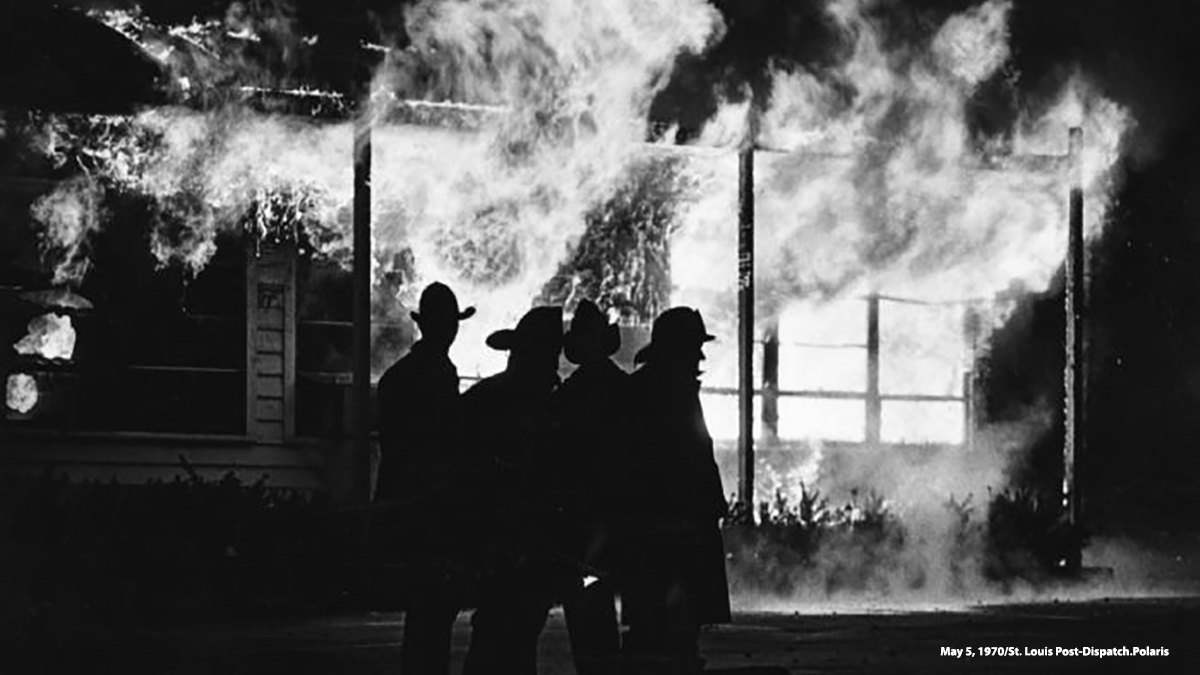
Donated Files Document Vietnam Era Activism
The Washington University in St. Louis Libraries Julian Edison Department of Special Collections has recently acquired 150,000 pages of documents arising from the Freedom of Information Act (FOIA) lawsuit in Seavey v. Department of Justice, et al.
The lawsuit was filed by Emmy Award-winning documentarian Nina Gilden Seavey (BA ’78) in 2015 as she researched the presence of the FBI, the CIA, and the Department of the Army at WashU during the Vietnam Era. The lawsuit was the culmination of 358 separate FOIA requests concerning the lead-up and aftermath of the burning of an Air Force ROTC building on the Washington University campus on May 4, 1970.
Seavey’s victory over the government’s objection to the release of the documents paved the way for her eight-part episodic podcast series My Fugitive and her recently released chapter “Surveillance and Subversion of Student Activists, 1967-1970: Standoff in St. Louis” published in Left in the Midwest: St. Louis Progressive Activism in the 1960s and 1970s (University of Missouri Press, December 2022).
“Within these thousands of documents, I was only barely able to scratch the surface of the work to be mined by future journalists, documentarians, scholars, and students,” Seavey said. “Because of the breadth of my request to the government, I captured thousands of documents related and unrelated to my specific topic but ripe for further exploration into the history of progressivism in St. Louis, the anti-war movement in the Midwest, and most specifically the government’s presence on the Washington University campus in the turbulent decades of the 1960s and ’70s.”
“In previous years, FOIA requests would have resulted in reams of difficult-to-navigate paper,” said Miranda Rectenwald, curator of local history. “Since Seavey received the FOIA requests in digital format, now interested researchers can easily request PDFs from Special Collections.” Digital Archivist Robert Manley worked with Seavey to transfer the files, and ensure that the organizing and tagging, completed by her team, would be maintained for the benefit of future researchers. It is anticipated that materials will be made available for browsing once digital infrastructure updates are completed at the University Libraries.
“Frequently the history of the Midwest is overlooked by historians and the media in deference to the East and West Coasts,” said Seavey. “But what this primary source collection reveals is the critical role that the Midwest—and most specifically Washington University—played in the history of dissent and the government’s repression of it. I hope that storytellers and historians for decades to come will embrace this material to bring the Midwest to its rightful place as a crucible for change in the history of the twentieth century.”
Seavey was interviewed by the University Libraries about her research in the archives for the My Fugitive project in 2021.
To learn more about this collection, contact Curator of Local History Miranda Rectenwald at mrectenwald@wustl.edu.
About the Julian edison department of special collections
The Julian Edison Department of Special Collections at Washington University Libraries strives to collect, preserve, promote, and make accessible rare, archival, and/or primary source materials that enrich teaching, learning, and research for the Washington University community and beyond.
